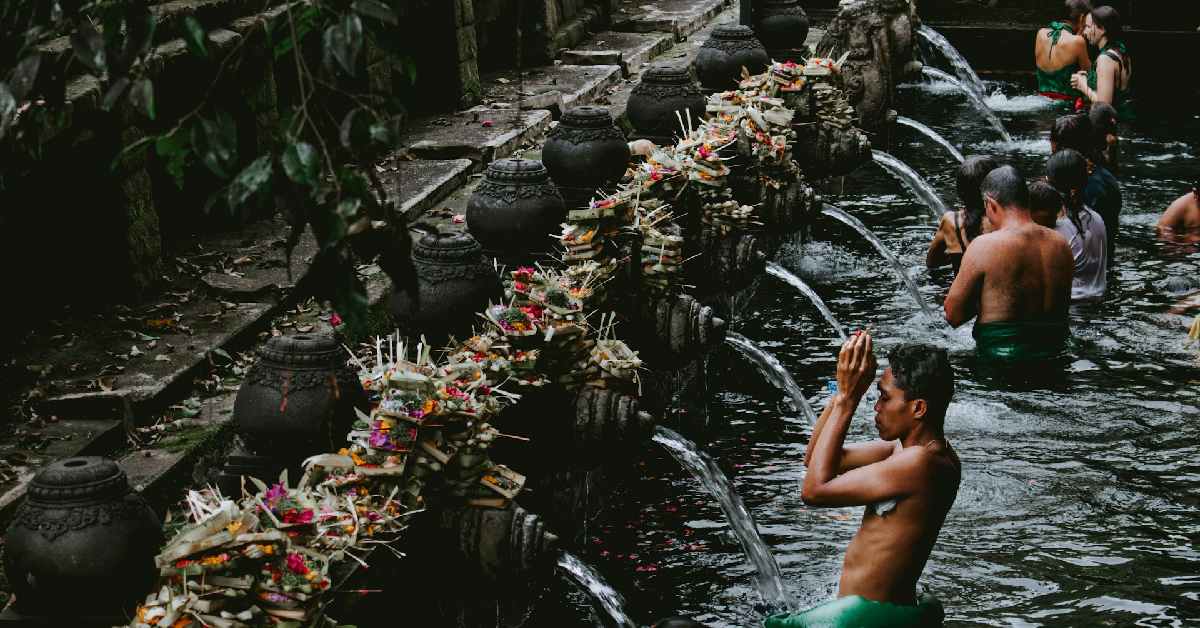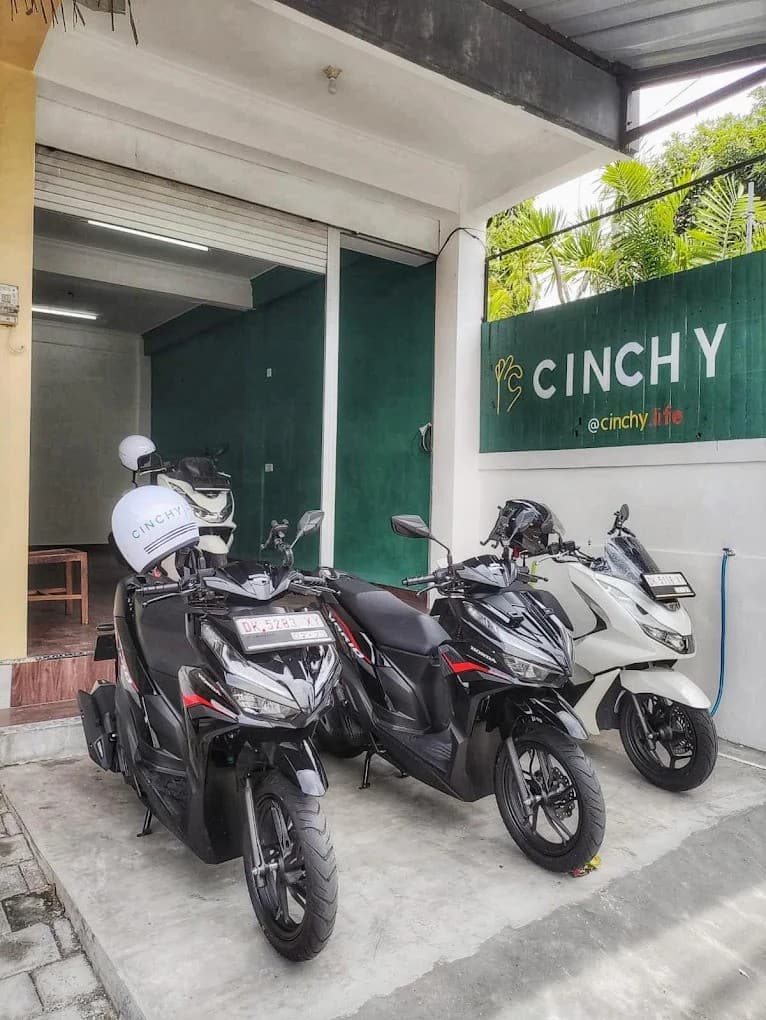scroll for more! ⟶
Cinchy Blog / Bali Temple Etiquette: A Guide for Visitors
Bali Temple Etiquette: A Guide for Visitors
Published: 02 Aug 2025
By Syahrial Maulana Sudarto
Travel Enthusiast

Book Your Ride in Just 1 Minute!
Free Cancellation
24/7 Support
Insurance
Start Date - End Date
Start Time
End Time
Duration
0 Day(s)
Bali captivates with its vibrant culture, stunning landscapes, and profound spirituality. Central to this spiritual essence are its countless temples, known as pura, each a testament to Balinese Hinduism.
Visiting these sacred sites offers a unique glimpse into the heart of the island’s beliefs and traditions. However, to truly appreciate their sanctity and show respect for local customs, it’s essential to understand and adhere to Bali temple etiquette.
This guide is designed for both international and local tourists, ensuring your temple visits are respectful, enriching, and memorable.
Understanding the Sacred Zones of a Pura
Balinese temples are meticulously designed with three hierarchical zones, each with specific access rules:
Nista Mandala (Jaba Pisan): This is the outermost zone, serving as the preparation area. As a visitor, you can generally enter this area freely.
Madya Mandala (Jaba Tengah): This middle zone is where art performances take place and where offerings are prepared. Typically, only Hindu devotees participating in worship are permitted here.
Utama Mandala (Jeroan): The innermost and most sacred sanctuary, this is where the main worship takes place. Non-Hindu visitors are strictly prohibited from entering this area unless granted special permission, usually for specific cultural or religious purposes and always accompanied by a priest (pemangku) or authorized guide.
The Essential Bali Temple Dress Code for Tourists

What to wear to Bali temples is perhaps one of the most common questions, and it’s crucial for showing respect. The Bali temple dress code for tourists emphasizes modesty and cleanliness.
Kain Sarung (Kamben): This is absolutely mandatory for all visitors. It’s a piece of cloth that must wrap around your lower body, covering from your waist down to at least your ankles.
Selendang (Senteng/Sabuk): A sash is also required, tied around your waist. This symbolizes the "binding of bad intentions" and is often yellow (salempot) as a sign of respect.
Atasan (Top): Your top must cover your shoulders and upper arms. Avoid tank tops, strapless tops, or anything too revealing, transparent, or tight-fitting.
Udeng (Headband): For men, an Udeng (traditional headband) is mandatory if you participate in a prayer ceremony (odalan), but not strictly required for just visiting.
Hair: If you have long hair, it should be tied neatly; avoid leaving it loose.
Don't worry if you don't have the appropriate attire.
Many temples offer a Bali temple attire rental service on-site, typically for a small fee (around IDR 20,000-50,000, or approximately US$1.20−3.00/AU$1.90-4.70), allowing you to rent a sarong and sash.
Cleanliness for Body and Spirit
Both physical and spiritual cleanliness are paramount before entering a pura.
Physical: It is advisable to bathe before your visit. Also, avoid entering if you have an open wound or are bleeding.
Spiritual: Cultivate a calm mind and avoid negative emotions.
Cuntaka (State of Impurity): Certain conditions are considered impure, and individuals in these states are prohibited from entering temples:
Women who are menstruating or have recently given birth (within 6 weeks).
Individuals in a state of mourning (if a close family member has passed away within the last 3 days).
Anyone who has recently returned from a funeral.
Respectful Behavior in Bali Temples

Once inside, your behavior should reflect the sacredness of the surroundings.
Footsteps: Be mindful not to step on canang sari (daily Balinese Hindu offerings) found on the ground. If you accidentally do, discreetly apologize.
Body Posture:
Never sit higher than a priest (pemangku) or the offerings.
Avoid pointing your feet towards the altar or offerings; instead, sit cross-legged or kneel.
Voice: Speak softly and keep your phone on silent. Loud noises or ringing phones can disrupt the concentration of worshippers.
Touching: Do not touch any ornaments, statues, or prayer instruments.
Photography and Electronics Etiquette
While capturing the beauty of Balinese temples is tempting, certain rules apply.
Permission: Always ask for permission before taking photos, especially during a ceremony (odalan).
Restricted Areas: Do not photograph inside the Utama Mandala or during private rituals.
Technicalities: Avoid using flash photography and do not point your camera directly at the faces of worshippers or priests.
Drones: Drones are generally prohibited unless you have written permission from the temple management.
Crucial Prohibitions to Observe
To maintain the sanctity of the pura, avoid these actions:
Littering/Spitting: Do not litter or spit anywhere within or around the temple grounds.
Restrooms: Toilets are usually located outside the temple gates; use them before entering.
Food/Drink: Do not bring food or non-offering drinks inside.
Public Displays of Affection: Kissing or overly affectionate gestures are considered highly inappropriate in sacred areas.
During a Religious Ceremony (Odalan)

If you happen to visit during an odalan, a temple ceremony, observe these guidelines:
Silence and Distance: Maintain silence and keep at least 5 meters away from the participants.
Do Not Cross: Never walk in front of people who are praying.
Participating in Rituals: Only join a ritual if you are officially invited, for instance, if a priest (pemangku) at Tirta Empul guides you through the holy water ritual.
Read Also:
7 Best Places to Do Melukat in Bali
How Much Does the Melukat Ceremony Cost?
Specific Temple Rules
Some temples have unique rules:
Pura Luhur Batukaru: Children who still have milk teeth are not permitted to enter.
Pura Dalem Ped: Wearing checkered (poleng) clothing is prohibited.
Pura Besakih: Visitors are generally required to be accompanied by a local guide.
Read Also:
4 Temples in Seminyak Bali for Cultural Visit
10 Famous Temples in Bali: Best Spiritual Tourism Destinations
Explore Bali’s Temples Easily with a Scooter from Cinchy!

While many temples are in popular tourist areas, the most authentic and less crowded ones are often a little off the beaten path.
This is where having your own transport, like a scooter, becomes a game-changer.
At Cinchy, we make exploring Bali effortless and safe.
We provide well-maintained and safe scooters so you can focus on the adventure, not the mechanics. Our rental fleet is regularly serviced to ensure your safety and peace of mind.
Our rental process is quick, easy, and designed with your convenience in mind. Simply bring your valid ID (Passport or KTP), valid driving license (International or SIM C), round trip flight tickets, and hotel bookings, and you'll be on your way in no time.
What makes Cinchy the best choice?
Competitive Prices: Whether you need a scooter for a day, a week, or a month, our packages are designed to fit your budget. Daily rental starts at just IDR 95,000, weekly rental at IDR 560,000, and monthly rental at IDR 1,500,000.
24/7 Support: Our friendly customer support team is always available to help you, day or night.
Free Delivery & Pickup: We offer complimentary scooter delivery and pickup services in major urban areas in Seminyak, making the process even more convenient for you.
Complete Amenities: Every rental comes with a quality helmet, disposable hair nets for hygiene, a phone holder, and a free raincoat to keep you dry during those sudden tropical showers.
By following this guide on Bali temple etiquette and choosing a reliable rental service like Cinchy, you are set for a memorable and respectful journey through the spiritual heart of Bali.

